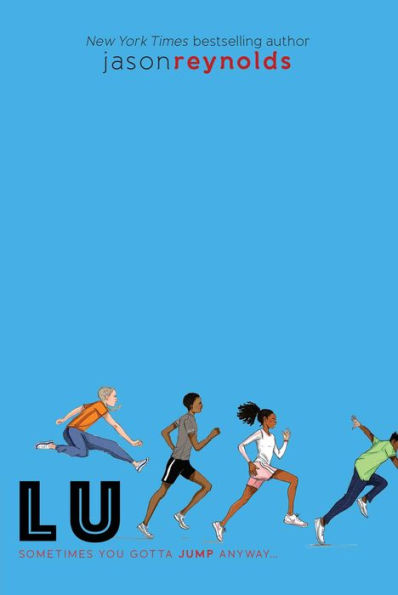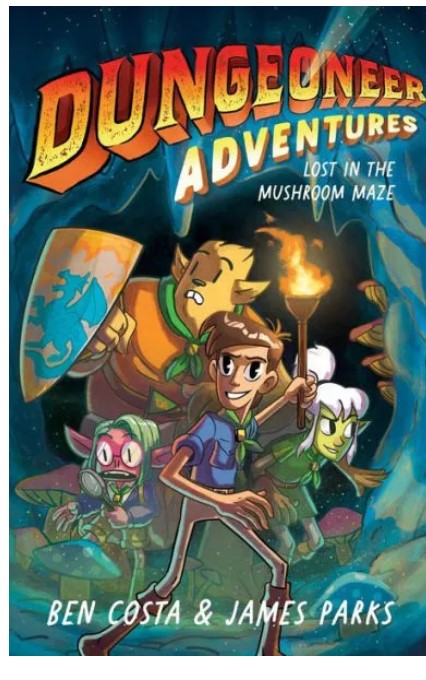Lu’s birth was a miracle, and he’s used to being the only child and track star in the house. That is until Lu’s parents break the news that he’s going to be a big brother. In the final installment of the Defenders Track Team, Lu grapples with his father’s drug-dealing past, his mother’s unusual fruit masterpieces, and his own fears. All the while he’s trying to pick a name for his new sibling and help his team win the end-of-season track championship. Lu struggles while running hurdles; it’s the one race where he can’t seem to get past the first twelve steps.
Lu builds on the growth of the characters in the previous three books. However, Lu spends more time tackling personal integrity, drug abuse, and forgiveness. Lu’s teammates, family, and coach help him learn how to be a compassionate person who rights his wrongs, and he becomes a big brother that his little sibling can look up to. By now, the Defenders track team is a full-fledged family, and the end of the novel wraps up their journey together.
Reynolds knows how to write young teenagers’ voices. Lu’s voice strikes the balance between self-confident and insecure. He’s a great runner, and he’ll be sure to tell everyone about it, but the thought of running hurdles makes him afraid. Lu worries, would he be a good big brother? Can he face his childhood bully and show him kindness? Lu is a good kid, but his ability to overcome his fears and not let them consume him makes his character compelling. Lu even inspires others around him to be better by demonstrating integrity and eventually apologizing for his actions.
Lu is a good end to the series. Unlike the first book, not a lot of big events occur. Despite this, the story never seems to drag, and the smaller plot points carry more weight as they develop the characters. Reynolds’s straightforward style and vernacular usage are fun, and they help make the story believable and interesting.
Readers will enjoy the end of the Defenders Track Team series because it neatly ties up all the characters’ conflicts and ends on a compassionate note. If the reader has read the previous three books in the series, they should definitely read Lu because these books take themes like family, friendship, and track and give them life. Most importantly, these books ask the reader to always be the best version of themselves.
Sexual Content
- Patty teases Lu about a girl named Cotton, but Lu says “Patty was only teasing me about Cotton because she thinks I like her and we should go together. But I don’t. I do. But not like that. Not all the way. But she cool. But go together. Grease face? Nah.”
- Lu’s parents occasionally hug or kiss in greeting. When Goose, Lu’s father, returns from work, Lu’s mom “leaned over and kissed him on the cheek.”
Violence
- Lu and his family playfully slap each other on the arm. For instance, when Lu hears about being a big brother, Dad “popped me on the arm with the back of his hand” out of excitement about the big secret.
- Ghost playfully “slapped [Lu] on the arm” while getting a ride home after practice.
- Lu fantasizes about throwing an orange at Kelvin, his childhood bully. In his daydreams, he “cocked [the orange] back like a pitcher, and fast-balled it at his ugly face.”
- There are references to previous books when Ghost’s dad tried to kill Ghost and his mom. According to Ghost, Mr. Charles “saved our lives. He hid my mom and me in his storage room.” No other details are given.
- Lu and his teammate Aaron get into a fight when Aaron trips Lu while running. Lu says Aaron “charged me and shoved me with his whole body, and I flew to the ground.”
- It is implied that Ghost gives Lu a wedgie. The team was chatting with Lu when “one of them thinking it would be funny to give me a wedgie.” The wedgie is played off as friends goofing around.
- It is implied that Kelvin was abused at home, probably by a parent since it is also mentioned that he went to live with his grandparents. While at the basketball court, Lu sees that Kelvin has “no blue-and-purple spots on his arm. No marks.”
Drugs and Alcohol
- A former runner referred to as “the Wolf” now has a drug addiction and begs for money. After giving him a dollar, Coach Brody says to Lu, “To me, that’s embarrassment. Not the dope—that’s illness. But to let something get in the way of your full potential…” There are many references to Wolf’s addiction throughout the book.
- Lu’s dad, Goose, explains how he started selling drugs at 15. His dad says, “I’ve told you that before, and you know I’m not proud of it.” This is the extent of the conversation. Later it is revealed that Goose sold the Wolf “his first hit.”
- Coach Whit convinces her brother and former track star, the Wolf, to check into a rehab center. Goose brings Lu along because Goose works with people struggling with addiction, and he wants to give Lu a chance to see what he does.
- While sitting in the rehab center, Lu talks about the pamphlets he reads. Lu says, “I sat in the waiting room for what seemed like forever, reading these papers about detox, and how sometimes before they can even start real treatment they have to let the drug pass through people’s bodies, and how terrible it feels to, like get all the stuff out of you.”
- At the dinner table, Goose drinks a beer. Lu says, “Juice for Mom. Beer for Dad. Milk for me.”
Language
- The book is written in the main character’s vernacular, so the grammar is often purposefully incorrect, like when Lu says, “lightning so special it don’t never happen the same way or at the same place twice.”
- A couple of times, Lu is flippant towards his parents. Early on, when he describes listening to his mother, he says, “I swear, sometimes she just be talking to be talking.”
- Lu says that Shante Morris “looks like a horsefly” because “her eyes kinda made her look like she was always surprised how nasty those cupcakes were every year. Ha! Sorry.”
- Words like shut up, dang, fool, stupid, and hater are all used frequently throughout the book.
- Lu has albinism, so characters will make comments about it. For example, he notes that in his yearbook people write “Have a nice summer, you fine-o albino.”
- When his dad is late, Lu considers calling him a “booboo-faced clown.”
- Lu’s family has plenty of playful banter, like when Lu returns from practice and his parents tease him by saying, “You smell like bananas” and “stinky son.”
- Lu has a laundry list of nicknames for a kid named Kelvin (“Smellvin”), who made fun of him for his albinism.
- Two pages are dedicated to the things that Kelvin has said to Lu. Some of the more creative insults on the list include: “You look like a cotton ball dipped in white paint,” “Like milk. Like somebody supposed to pour you over cereal,” and “Like grits with no butter.” Of Kelvin’s appearance, Lu says, “It don’t even look like he was born, but instead was built, but together in some kind of blockhead bully factory.”
- Coach Brody and Goose knew each other as kids, and Coach Brody would make fun of Goose for his stutter. Coach told Goose, “You sound like a choking Chihuahua.”
Supernatural
- None
Spiritual Content
- Lu refers to his birth as “a miracle,” and at one point he says that his mom having another child was “magic.”
by Allison Kestler










